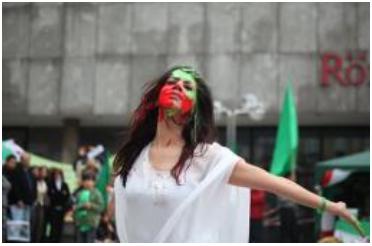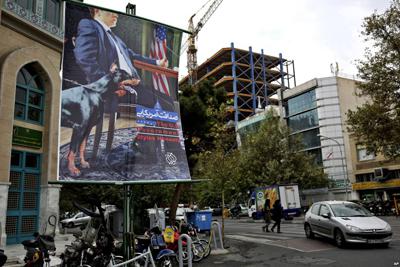
Earlier this month, shortly after IranWire published my interview with the rape survivor Mina Khani, my inbox was flooded with emails from men and women in Iran and the Iranian diaspora sharing their stories of rape and sexual abuse at the hands of family members. I was overwhelmed by the scope of the response and compelled to write a follow up article. It was only then that I began to realize the scope of the problem: the extent to which even speaking about such acts remains taboo amongst Iranians, and the innumerable survivors of rape and incest in our community who live in silence. As a former journalist in Iran who worked on social issues, I had heard hushed stories of survivors of rape and incest, but I never knew how widespread the problem it was until I decided to delve deeper and write a story myself.
After a long hiatus from journalism, I became interested in this topic when I saw Mina post a Facebook status alluding to rape. The response she received was so horrific that she ended up deleting her status. Mina, a theater actress now residing in Germany, was raped from the age of nine to 13 by her maternal uncle. She carried the trauma of her rape with her, only telling her mother, who encouraged her to remain silent in fear of exposing her uncle.
Silenced, and with nowhere to turn as a 13- year-old, Mina dealt with severe depression and anorexia until she learned to put the experiences behind her as well as she could. It wasn’t until 2011, when the theater director Reza Jafari approached her to play the leading role in Ziyafat, a play about a rape survivor, that Mina’s old ghost resurfaced. “Playing a role that was so close to the story of my own life was difficult,” Mina told me in our interview. “I came face to face with old fears and issues I had never really worked through. I started having panic attacks and shortness of breathe. It was after playing this part that I decided to go to therapy for the first time.”
Through therapy and the power of theater, Mina took the decision to become vocal about her experiences. “I came to ask myself, why does my society judge the survivors? Why, instead of having support and the space to heal, are we encouraged to remain silent? This silence is what allows these rapes to continue.”
Most of the survivors who emailed me explained that they stayed silent in order to protect their reputation along with that of their family. In a society in which a woman’s virginity, at least belief in her virginity, is often still crucial to securing a husband, a rape survivor’s family would rather not make her rape public for fear of ruining her chances for marriage later in life.
In cases of sexual abuse of young boys, the reluctance to bring shame upon the family causes hundreds of victims to stay silent about the abuse. Relatives and close family members who are aware of the abuse often act as its enablers, pretending not to know or encouraging the victim to simply avoid the abuser.
N.T., a women’s rights activist and a journalist wrote me to confess that she, too, was a survivor of child rape, and had never before spoken about it to another person. She wrote in her email that although she knew in her head that she should speak out, as her silence only aids the problem, she could not bring herself to do so. She said she has always feared the way rape survivors are labeled in Iran. In a sense, the trauma is extended rather than alleviated by society's response.
The taboo of speaking out this issue and exposing herself as a victim of rape was what kept Mina silent for so long, but she told me she was finally ready to speak out. “I want to bring this issue that is under the surface of our society, under the surface of our homes, out in the open. Let people judge me. Let them say that I’m trying to gain notoriety,” she said. “I have the theater stage to fulfill any needs I may have for attention. This is a real issue, I’m a survivor of child rape by a family member, and we need to learn how to talk about this as a society.”
In doing research for the original article, I realized that there is very little information or resources in Persian about rape, rape survivors, incest, and sexual abuse in Iran or the Iranian community in diaspora. During my interviews and the emails I received afterwards, it became evident that the survivors I spoke to did not know whom they could turn to for help, especially if their families demanded their silence on the issue.
Speaking with researchers and experts of sexual abuse in Iran, they all shied away from giving me a statistic or a sense of the scope of the problem of rape and incest --there’s simply no way of really knowing, they all said to me. Too many people stay quiet on the issue to gain a realistic sense of the scope. The only statistic I was able to find was on a blog that cited a report published by Resalat newspaper in 2011 (Iranian year 1390). That report cited that in 2011, 5,200 court cases of reported rape were made raised before the judicial system; 1,200 of those cases related to father’s raping daughters, and 4,000 related to brother’s raping their sisters. However, drawing on my previous experiences as a reporter in Iran, and also having spoken to many survivors, I know how few of them actually make a complaint about to the courts, given that the country's Islamic criminal codes effectively make it impossible for women to prosecute their abusers.
Haniyeh, a 28-year-old woman, wrote to me from Tehran. She said her father regularly raped her and she finally decided to file a complaint against him in family court. The judge ignored her claim, telling Haniyeh to correct her ways and respect her hardworking father. The judge then threatened to fully dismiss her case unless Haniyeh was able to bring four witnesses to testify that they saw her father rape her. She wrote to me: “Ma’am, you tell me, which father rapes his daughter in front of four witnesses?”
According to Iranian law, incest is punishable by death, but if the rapist claims that the intercourse was consensual, the female survivor has to either present four witnesses to the rape, or the judge has to believe her story. If she is unable to present the four witnesses and the judge elects not to believer, she can be sentenced to death. In such a legal atmosphere, it is understandable that many female survivors of family rape remain silent in Iran.
The stories are hushed, but they are legion. The taboo about incest and rape needs to be changed from a grassroots level inside Iran and in the Iranian diaspora. The survivors I spoke to are afraid to be judged by family and society, afraid to be told that the rape was probably their fault, that next time they should be careful about how they dress and how they act, and they know that they won't get justice in courts. As Mina said to me, it is the role of our artists and intellectuals to offer a new language to speak about these issues, to offer examples in which we embrace rather than blame the survivor, enabling them to heal from their trauma and hold their perpetrators to account for their crimes.
visit the accountability section
In this section of Iran Wire, you can contact the officials and launch your campaign for various problems























comments